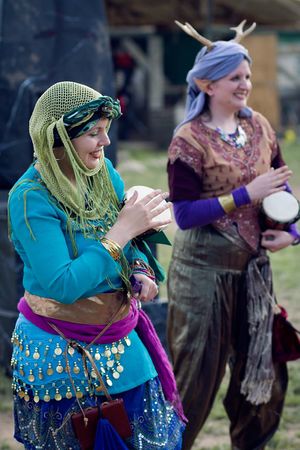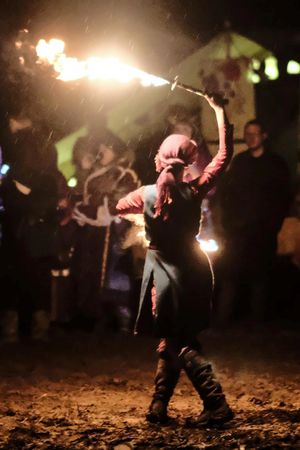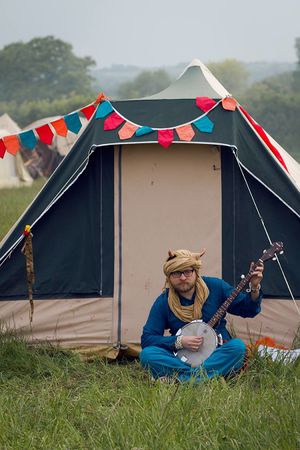The Brass Coast music
Wildwinter (talk | contribs) m (moved Siroc Music to The Brass Coast Music) |
m (I suspect it is not getting done) |
||
| (44 intermediate revisions by 8 users not shown) | |||
| Line 1: | Line 1: | ||
==The Music of | ==The Music of The Brass Coast== | ||
===Style summary=== | ===Style summary=== | ||
Like the Freeborn themselves, their music is rhythmic, vigorous and fiery. Waily reeded or brass instruments, rich vocal harmonies and the strumming of strings resound in counterpoint with the ever-present syncopation of drums, tambourines and claves. It is said a Freeborn will make an instrument out of anything - hands, cutlery, tables and crockery are all used to enthusiastically accompany performers. Their vocal tradition involves not only the singing of complex melodies and accompaniment but also encourages others to join in ululating harmonies, drones and chants. The overall impression is vibrant, noisy and enthusiastic - music, like everything in their lives, is to be savoured to the utmost. | |||
Brass Coast music draws on the real world inspiration of Corsican music, Spanish Pilgrim songs, Italian lauda, and New World sea shanties. Although they are a seafaring nation, more traditional English shanties (such as Poor Tom Bowling, The Mermaid etc.) would be better suited to the musical tradition of the Marches. | |||
<row-fluid> | |||
<span12>{{CaptionedImage|file=FreebornDrumming.jpg|width=300}} {{CaptionedImage|file=FreebornFlame.jpg|width=300}} {{CaptionedImage|file=FreebornMusic.jpg|width=300}}</span12> | |||
</row-fluid> | |||
===Commonly known songs=== | ===Commonly known songs=== | ||
' | * [[Riqueza's Dream]] - Telling one version of the tale of the [[The Brass Coast history|founding of the Brass Coast]] this song is popular in taverns and Alcazars. It has sparked off several diplomatic incidents by 'accidentally' offending Highborn visitors. | ||
* [[Sail Away Across the Sea]] - This popular song expresses the Freeborn's joy in a seafaring life. | |||
' | |||
====A musical tradition==== | ====A musical tradition==== | ||
Various kinds of performance are inherent to the practice of magic in the Brass Coast. See [[Brass Coast Magical Traditions]] for more information. | |||
===Further examples=== | ===Further examples=== | ||
====Songs==== | ====Songs==== | ||
* [[Fire Maringo]] - easy call and response song | |||
* [[Riqueza's Dream]] - medium call and response song | |||
* [[Sail Away Across the Sea]] - medium call and response song | |||
* [http://www.youtube.com/watch?v=1yQkJ9aaZKg Stella Nuova] | |||
* [[Inez y Guerra]] - medium call and response about a famous Captain | |||
* [[Wagon song]] - medium difficulty travelling song with chorus accompaniment | |||
* [[Without You]] - hard Corsican chant in 3 parts | |||
* [[Lost Segura]] - plaintive lament for lost territory. | |||
* [[Virtue Never Falter]] - rousing chorus song also widely sung in Highguard | |||
* [[Farewell Farewell]] - rousing funeral song from Highguard but also popular in the Brass Coast due to boat references | |||
====Instrumentation and tunes==== | |||
====Instrumentation==== | High percussion e.g. tambourines, shakers, clapping, high drums; reeded woodwind (especially if a bit waily and 'snake charmer' sounding); high metallic pipes/penny whistles; jangly bouzoukis or guitars. | ||
====Other performance traditions==== | ====Other performance traditions==== | ||
* Dance/fire dance, a huge part of [[Brass Coast Magical Traditions]]. | |||
===How to adapt your repertoire=== | ===How to adapt your repertoire=== | ||
'' | * Never perform without giving your audience a way to join in. Get them clapping or stomping, or tell them to cheer or repeat when they hear certain words. If you are ambitious teach them a simple ostinato to go under the song. It's all about the participation! | ||
* Rhythms could be much lighter than other nations, keep them syncopated (off beat), and on tambourines, castanets, shakers, or light drums. Keep your playing light and bouncy! | |||
* Don't be afraid to ornament when you are singing, have a listen to some waily Spanish or Arabic medieval music and copy the style into the songs you are choosing. | |||
===Our sources=== | ===Our sources=== | ||
' | * Instrumental: Susanna Seivane, | ||
* Song: Severa Nazarkhan, Corsican chants (e.g. Corsica: Chants Polyphoniques (CD) on Harmonia Mundi label), Spanish Music of Travel and Discovery (CD), various pilgrim songs arranged by Katy Cooper of Glasgow Madrigirls, Martin Codax's Songs of Friendship, Marie Kerouz (Maronite liturgical music), Nusrat Fateh Ali Khan (urdu-pop), [http://www.youtube.com/user/aranzoltan Arany Zoltan] | |||
* Good list of sea shanty lyrics (stick to the Spanishy sounding ones): http://www.boundingmain.com/Lyrics.htm | |||
A [http://www.youtube.com/playlist?list=PLA443043912BAAD2C Brass Coast youtube playlist] to get you in the mood! To add to this get in touch with Daisy or post your own. | |||
{{Brass Coast Links}} | |||
[[Category:Music]] | [[Category:Music]] | ||
Latest revision as of 16:10, 25 October 2025
The Music of The Brass Coast
Style summary
Like the Freeborn themselves, their music is rhythmic, vigorous and fiery. Waily reeded or brass instruments, rich vocal harmonies and the strumming of strings resound in counterpoint with the ever-present syncopation of drums, tambourines and claves. It is said a Freeborn will make an instrument out of anything - hands, cutlery, tables and crockery are all used to enthusiastically accompany performers. Their vocal tradition involves not only the singing of complex melodies and accompaniment but also encourages others to join in ululating harmonies, drones and chants. The overall impression is vibrant, noisy and enthusiastic - music, like everything in their lives, is to be savoured to the utmost.
Brass Coast music draws on the real world inspiration of Corsican music, Spanish Pilgrim songs, Italian lauda, and New World sea shanties. Although they are a seafaring nation, more traditional English shanties (such as Poor Tom Bowling, The Mermaid etc.) would be better suited to the musical tradition of the Marches.
Commonly known songs
- Riqueza's Dream - Telling one version of the tale of the founding of the Brass Coast this song is popular in taverns and Alcazars. It has sparked off several diplomatic incidents by 'accidentally' offending Highborn visitors.
- Sail Away Across the Sea - This popular song expresses the Freeborn's joy in a seafaring life.
A musical tradition
Various kinds of performance are inherent to the practice of magic in the Brass Coast. See Brass Coast Magical Traditions for more information.
Further examples
Songs
- Fire Maringo - easy call and response song
- Riqueza's Dream - medium call and response song
- Sail Away Across the Sea - medium call and response song
- Stella Nuova
- Inez y Guerra - medium call and response about a famous Captain
- Wagon song - medium difficulty travelling song with chorus accompaniment
- Without You - hard Corsican chant in 3 parts
- Lost Segura - plaintive lament for lost territory.
- Virtue Never Falter - rousing chorus song also widely sung in Highguard
- Farewell Farewell - rousing funeral song from Highguard but also popular in the Brass Coast due to boat references
Instrumentation and tunes
High percussion e.g. tambourines, shakers, clapping, high drums; reeded woodwind (especially if a bit waily and 'snake charmer' sounding); high metallic pipes/penny whistles; jangly bouzoukis or guitars.
Other performance traditions
- Dance/fire dance, a huge part of Brass Coast Magical Traditions.
How to adapt your repertoire
- Never perform without giving your audience a way to join in. Get them clapping or stomping, or tell them to cheer or repeat when they hear certain words. If you are ambitious teach them a simple ostinato to go under the song. It's all about the participation!
- Rhythms could be much lighter than other nations, keep them syncopated (off beat), and on tambourines, castanets, shakers, or light drums. Keep your playing light and bouncy!
- Don't be afraid to ornament when you are singing, have a listen to some waily Spanish or Arabic medieval music and copy the style into the songs you are choosing.
Our sources
- Instrumental: Susanna Seivane,
- Song: Severa Nazarkhan, Corsican chants (e.g. Corsica: Chants Polyphoniques (CD) on Harmonia Mundi label), Spanish Music of Travel and Discovery (CD), various pilgrim songs arranged by Katy Cooper of Glasgow Madrigirls, Martin Codax's Songs of Friendship, Marie Kerouz (Maronite liturgical music), Nusrat Fateh Ali Khan (urdu-pop), Arany Zoltan
- Good list of sea shanty lyrics (stick to the Spanishy sounding ones): http://www.boundingmain.com/Lyrics.htm
A Brass Coast youtube playlist to get you in the mood! To add to this get in touch with Daisy or post your own.
Further Reading
Core Brief
Additional Information


